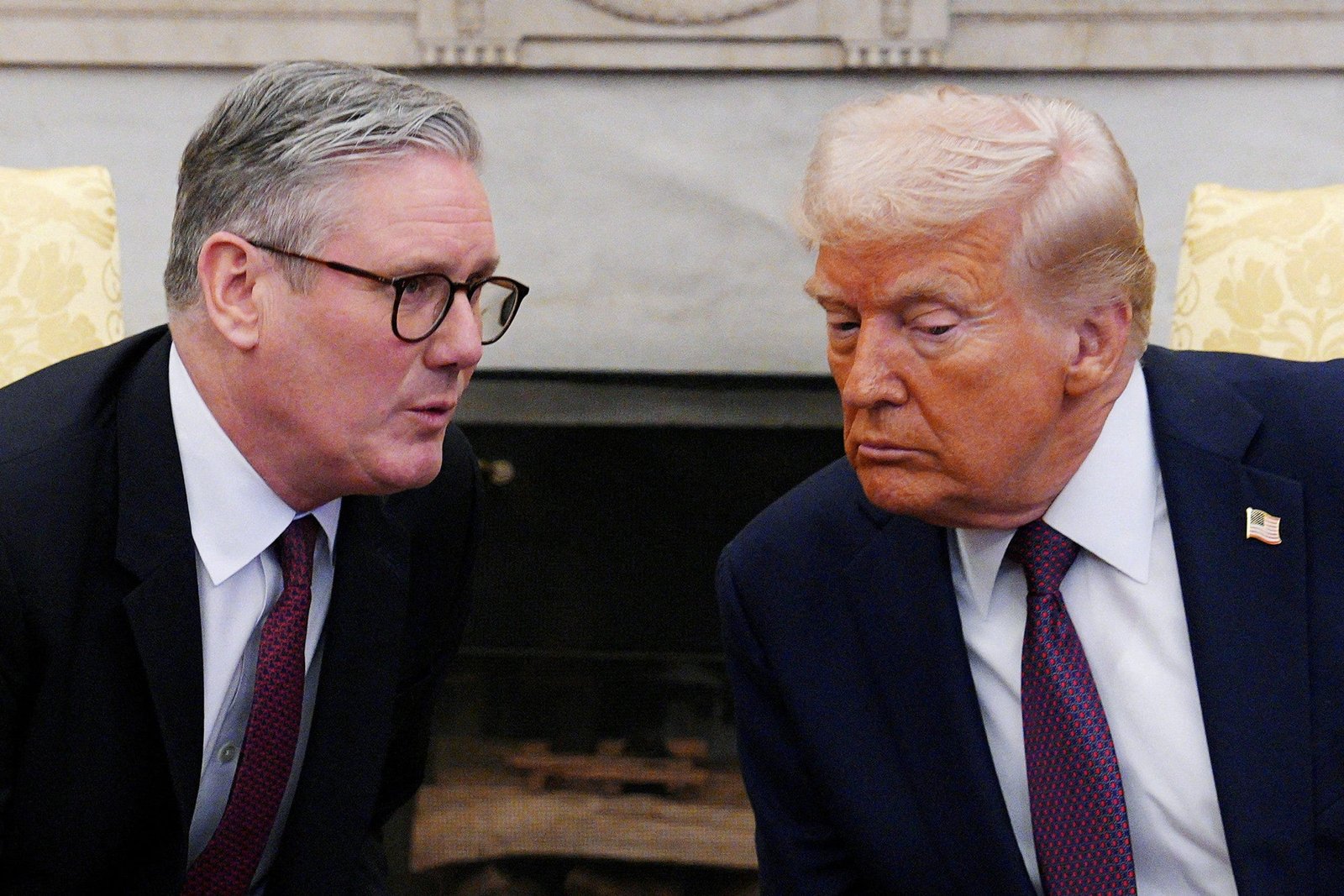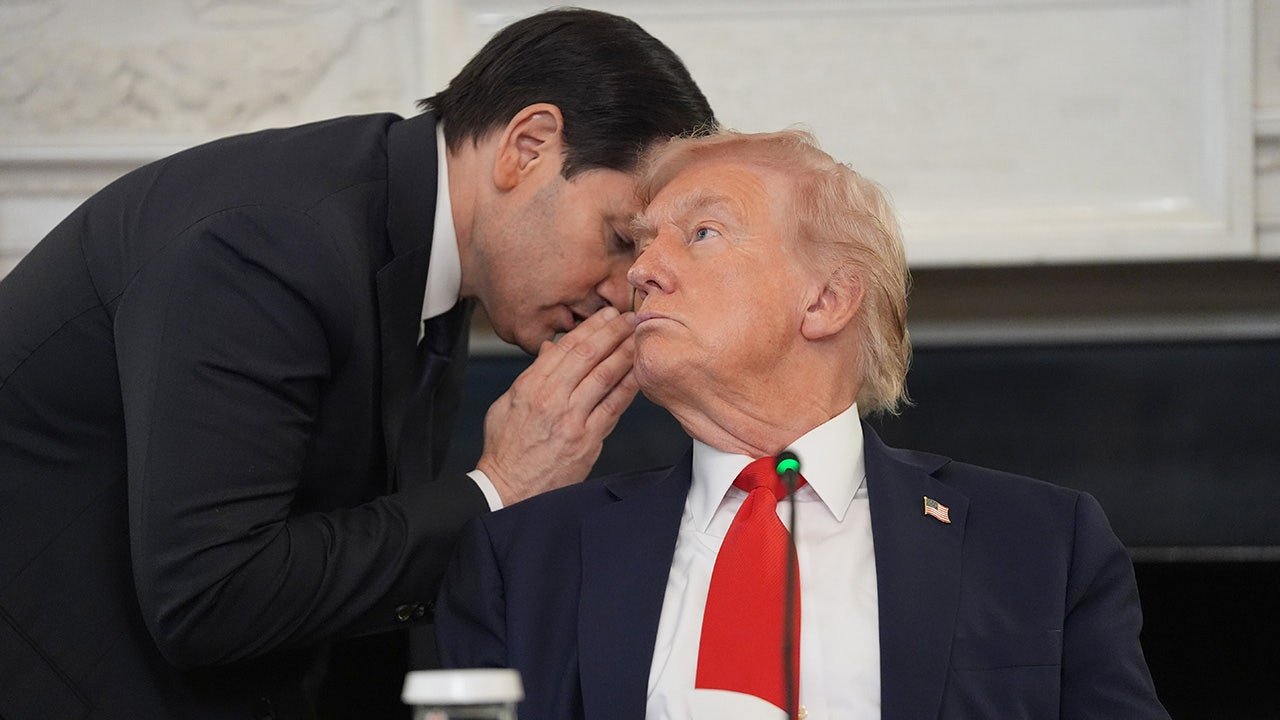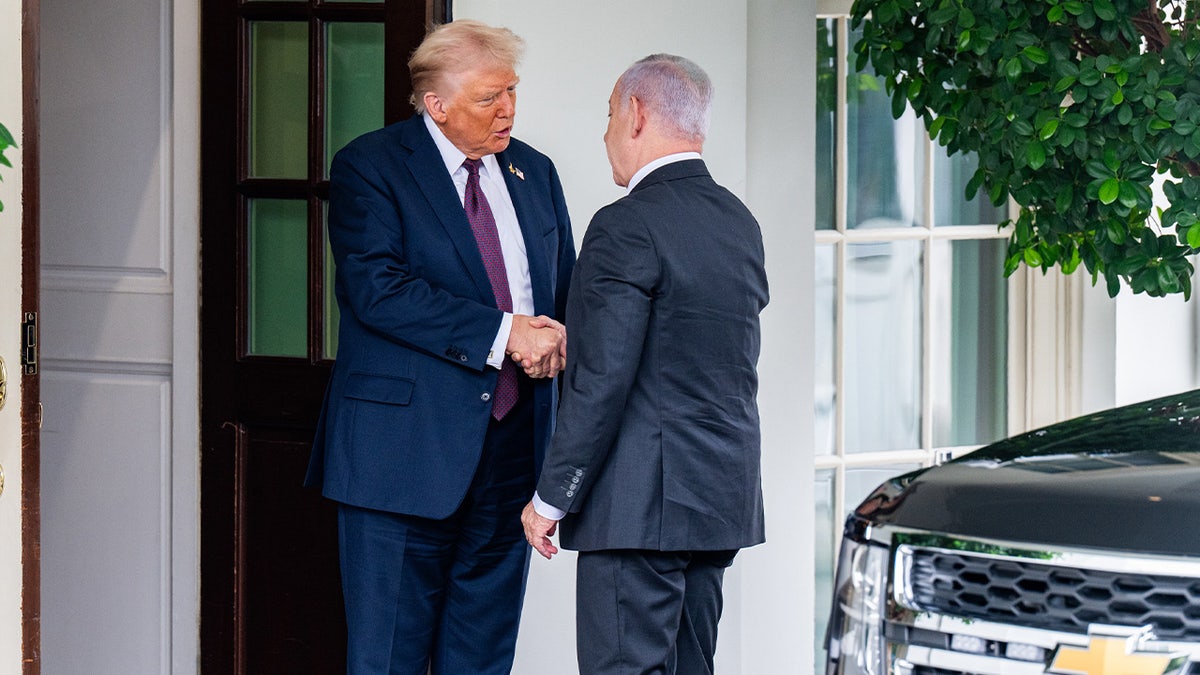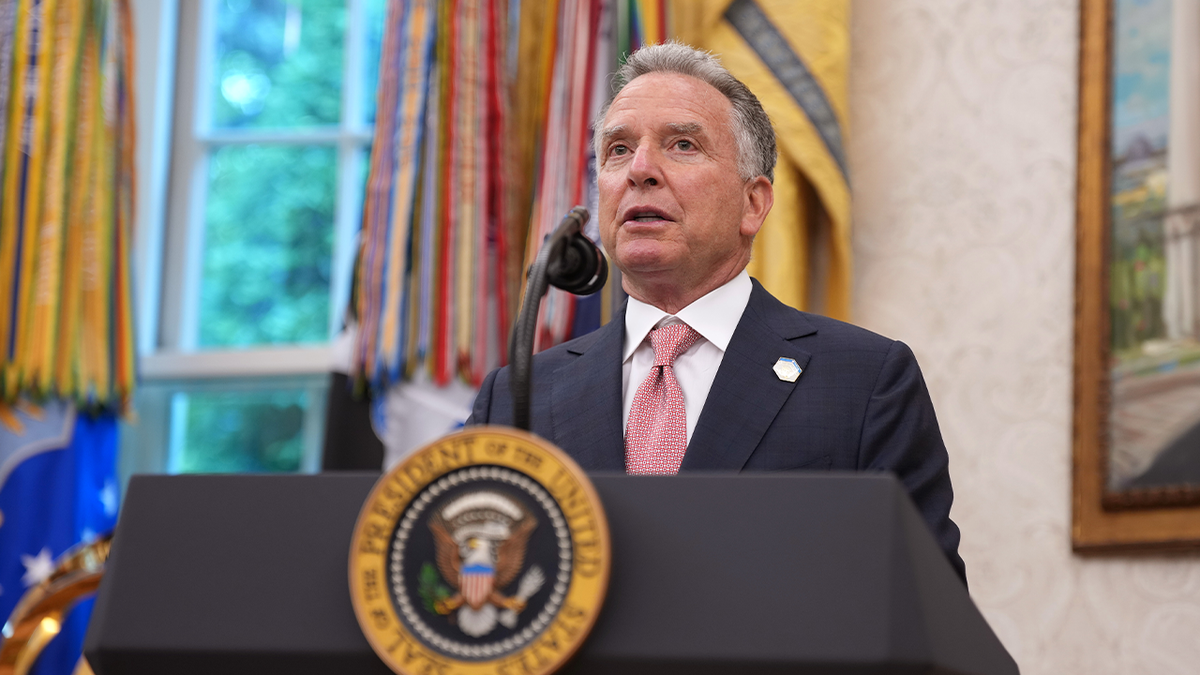INTERNACIONAL
UK urged to align with Trump on China or lose favored status in Washington

As President Donald Trump reshapes American foreign policy around hard-nosed deals and national self-interest, a new report warns the UK must rethink its strategy to preserve its «special relationship» – or risk being sidelined in Washington.
Darren Spinck, a fellow at the Henry Jackson Society, cautions that there will be no «business as usual» under Trump and that the «special relationship» between the U.S. and UK can no longer be taken for granted. To remain a key ally, Spinck argues in a new report, Britain must embrace Trump’s «transactional» approach to foreign policy.
«Choosing not to retaliate» against Trump-era steel and aluminum tariffs may signal a «strategic patience that may facilitate bilateral negotiations,» the report states. It outlines steps that Prime Minister Keir Starmer could take to align with the Trump administration and pursue a U.S.-UK free trade deal, including deeper security cooperation and a tougher stance on China.
Trump recently imposed 10% across-the-board tariffs on foreign nations and paused harsher levies he earlier proposed on every nation except China.
CHINESE OFFICIALS CLAIMED BEHIND CLOSED DOORS PRC PLAYED ROLE IN US CYBERATTACKS: REPORT
British Prime Minister Keir Starmer, left, leads the Labour Party. (Carl Court/Pool via REUTERS/File Photo)
Another path, the report suggests, could involve the UK seeking accession to the U.S.-Mexico-Canada Agreement (USMCA), the North American trade bloc, as a way to deepen economic ties with the United States.
The report also urges the UK Labour Party leadership to «reduce commercial dependency on the PRC rather than deepening it,» warning that closer economic ties with Beijing could strain U.S.-UK relations under Trump.
Spinck contrasted the Trump administration’s focus on «bilateralism, economic nationalism, and Indo-Pacific security» with the Starmer government’s preference for «multilateral diplomacy, progressive trade policies, and European security commitments.»
«This policy gap threatens transatlantic cohesion, weakening their collective ability to act against common adversaries, particularly China,» he warned.
Divergent policies on China, NATO commitments and Indo-Pacific strategy could erode Five Eyes intelligence sharing, which is key to UK national security.
Spinck called on the British government to strike a deal with the U.S. that addresses the White House’s digital privacy concerns – particularly after the UK ordered Apple to grant security agencies access to encrypted cloud data – and to launch a mineral mining partnership to bolster critical supply chains.
Whereas the previous conservative UK government deemed China its «greatest state-based threat,» the current liberal leadership has «reversed the course of the previous three Conservative Party Governments and has sought to strengthen economic ties with Beijing,» according to Spink.
He said the UK had recently advanced Beijing’s access to Western capital markets and re-established bilateral frameworks on industrial, trade and energy policy with China.
«One must wonder why London appears eager to expand economic ties with China – a country widely criticized for its human rights record – while the UK’s development finance institution has been less inclined to support international infrastructure development or mining projects in other regions.»
UK PRIME MINISTER TO ADMIT ‘GLOBALIZATION IS OVER’ IN RESPONSE TO TRUMP TARIFFS: REPORT

The UK’s growing relationship with China is a cause for concern for the U.S., according to the report. ( Stefan Rousseau/Pool via REUTERS)
«As the Trump Administration seeks to further accelerate America’s decoupling from targeted CCP economic and technology sectors, the US feels that the Labour Government’s apparent rapprochement with Beijing, after years of cautious relations following the PRC’s 2020 breach of the Sino–British Joint Declaration, could unnecessarily complicate the «Special Relationship,» Spink wrote.
He said that critical issues «requiring transatlantic cooperation,» such as a peace agreement between Russia and Ukraine, are «at risk» if the U.S. and the UK are not aligned on China policy.
The UK must also set aside its disagreements over U.S. domestic policy, according to Spinck, due to the more urgent need for security cooperation.
«As the Labour Government works with President Trump’s Administration, it should realize its views on a wide range of policies, including immigration, climate policy, digital privacy and welfare benefits, are vastly different,» he wrote.
READ THE REPORT BELOW. APP USERS: CLICK HERE
He said such «fractures» like the UK government’s demand for backdoor access to Apple’s encrypted cloud storage «have begun to define the overall relationship between the two allies, impacting the potential for foreign policy alignment.»
«Overcoming these cultural differences requires a shift to a more transactional model of foreign policy cooperation. Britain needs to take an active role in re-setting this agenda, pushing questions of domestic ideology to the margins in favor of solid, mutually beneficial measures.»
The UK could also signal goodwill by taking a tougher diplomatic stance on Iran. Spinck urged London to help close the «transatlantic divide» on Iran policy, which he said has «disrupted attempts to forge a coherent approach to stopping Iran’s nuclear progress.»
CLICK HERE TO GET THE FOX NEWS APP
While the U.S. withdrew from the 2015 Iran nuclear deal and imposed sweeping sanctions, the UK remained a party and declined to trigger snapback sanctions – even amid reports that Iran had violated the agreement and was enriching uranium to near-weapons-grade levels.
Spink also urged the UK to join the U.S. in designating Iran’s elite Islamic Revolutionary Guard Corps as a terrorist organization. Such moves, he argued, «would also be seen as a victory for the long-established Trump policy on Iran – one that would cost the UK nothing and would generate much goodwill in Washington, D.C.»
United Kingdom,China,Donald Trump,Xi Jinping,World Politics
INTERNACIONAL
Trump afirmó que los rehenes “serán liberados probablemente el lunes” y calificó el acuerdo entre Israel y Hamas como “paz en Medio Oriente”

El presidente de Estados Unidos, Donald Trump, calificó el nuevo acuerdo entre Israel y Hamas como “paz en Medio Oriente”, durante una entrevista telefónica en vivo con el presentador de Fox News, Sean Hannity, el miércoles por la noche.
“El mundo entero se unió en torno a este acuerdo”, afirmó.
Trump señaló que la liberación de los rehenes capturados por el grupo terrorista Hamas se concretará en los próximos días. “Los rehenes serán liberados probablemente el lunes”, declaró. “Mientras hablamos, se realizan muchos esfuerzos para liberar a los rehenes”, mencionó.
Al ser consultado sobre las próximas fases del plan, el mandatario indicó: “Creo que veremos la reconstrucción de Gaza. Estamos formando un consejo, un Consejo de Paz, así creemos que se llamará”. Añadió que el organismo será “muy poderoso”, aunque no especificó cómo funcionará.
Trump relató además una conversación reciente con el primer ministro israelí. “Hablé con Bibi Netanyahu hace un rato y me dijo: ‘No puedo creerlo, ahora le caigo bien a todo el mundo’”, contó. “Le dije: ‘Israel no puede luchar contra el mundo, Bibi’”, agregó.

El presidente estadounidense afirmó también que “otros países en el Medio Oriente ayudarán a reconstruir Gaza”, aunque no precisó cuáles. “Creemos que Gaza será un lugar mucho más seguro y que se reconstruirá, y otros países de la zona contribuirán a ello, porque poseen una enorme riqueza y desean que eso suceda”, explicó. “Participaremos para ayudarles a lograr el éxito y a mantener la paz”, añadió.
El anuncio se produjo pocas horas después de que Trump confirmara la firma de la primera fase del acuerdo de paz para Gaza, elaborado con el apoyo de Egipto, Qatar, Turquía y Estados Unidos, y respaldado por la Organización de Naciones Unidas (ONU).
La primera fase del plan, que será firmada este jueves en Egipto, contempla que en las próximas 72 horas Hamas libere a unos 20 rehenes con vida y que el ejército israelí se retire del territorio palestino.
Durante la negociación en Egipto, el grupo terrorista presentó una lista de prisioneros palestinos que desea liberar de las cárceles israelíes en la primera fase de la tregua.
A cambio, Hamas liberará a los 47 rehenes restantes, tanto vivos como muertos, capturados en el ataque del 7 de octubre de 2023 contra Israel, que desencadenó la guerra.

El presidente estadounidense declaró previamente a la prensa que lo más probable es que viaje a Egipto en los próximos días. “No lo hemos decidido con exactitud. Probablemente iré a Egipto. Es allí donde todos están reunidos ahora mismo, y lo agradecemos mucho, pero estaré haciendo la ronda, como suele decirse”, dijo.
La propuesta de Trump fue apoyada públicamente por el primer ministro de Israel, Benjamin Netanyahu, quien sin embargo matizó horas después que no respaldará la creación de un Estado palestino y que las tropas israelíes permanecerán desplegadas “en la mayoría” de Gaza, lo que generó dudas sobre la viabilidad de la aplicación del plan estadounidense.
La guerra comenzó el 7 de octubre de 2023, cuando milicianos de Hamas atacaron Israel y mataron a unas 1.200 personas, en su mayoría civiles, y secuestraron a 251. Como respuesta, Israel lanzó una campaña militar que devastó gran parte del enclave.
El Ministerio de Salud de Gaza, gestionado por Hamas y cuyas cifras son consideradas confiables por la ONU, reporta más de 67.000 palestinos fallecidos y cerca de 170.000 heridos, con la mitad de los muertos identificados como mujeres y niños.
Domestic,Politics,North America,Government / Politics
INTERNACIONAL
Manchester synagogue attacker ‘pledged allegiance to Islamic State,’ police say

NEWYou can now listen to Fox News articles!
The suspect behind last week’s deadly car and knife terror attack outside a synagogue in Manchester allegedly pledged allegiance to the Islamic State, authorities said.
Jihad Al-Shamie, 35, a British citizen of Syrian descent, allegedly called emergency dispatchers to claim responsibility for the attack before pledging allegiance to the Islamic State.
«We have conducted assessments across our systems, and I can reiterate that Al-Shamie had never been referred to the Prevent program, nor was otherwise known to Counter Terrorism Policing,» Assistant Chief Constable Rob Potts said Wednesday.
NFL HOLDS MOMENT OF SILENCE FOR VICTIMS OF YOM KIPPUR TERROR ATTACK IN ENGLAND
Emergency services escort people to safety after a car and knife terror attack outside Heaton Park Hebrew Congregation Synagogue in Manchester, England, Thursday, Oct. 2, 2025. Police said two people were killed, and four others injured before armed officers shot the suspect. ( Christopher Furlong/Getty Images)
UK POLICE ACCIDENTALLY SHOT VICTIM WHILE RUSHING TO STOP SYNAGOGUE ATTACKER
The Prevent program is a U.K. government initiative aimed at offering individuals who are susceptible to radicalization proper interventions to stop them from becoming terrorists or supporting terrorism.
Head of Counter Terrorism Policing Laurence Taylor said on Oct. 3 that while Al-Shamie was not known to the counterterrorism team, he was on bail at the time of the attack after being arrested on suspicion of rape.
Potts said that police are now «more confident that he was influenced by extreme Islamist ideology, the 999 call forms part of this assessment.»
While Potts pointed to the call as evidence of Al-Shamie’s motivation, he stressed that authorities needed to look across all evidence gathered to determine the motive behind the attack.
«This assessment continues, and there may be further drivers and motivations identified,» Potts added.

A police vehicle parked outside the Manchester synagogue, where multiple people were killed on Yom Kippur in what police have declared a terrorist incident, in north Manchester, Britain, on Oct. 5, 2025. (Hannah McKay/Reuters)
Al-Shamie was shot by police outside the Heaton Park Hebrew Congregation Synagogue after the attack in which he rammed a car into pedestrians before attacking them with a knife. The attacker was wearing what appeared to be an explosive device, but Potts called it a «hoax device» and said it was later assessed and confirmed to be «non-viable.»
Two congregants, identified as Adrian Daulby, 53, and Melvin Cravitz, 66, died in the attack, which took place on Yom Kippur, Judaism’s holiest day.
Police later said that it was likely one of the two victims was accidentally shot by officers who were rushing to stop the attack, as Al-Shamie did not have a gun on him. Reports indicate Daulby was the one shot.

Emergency services on scene after a car and knife attack outside Heaton Park Hebrew Congregation Synagogue in Manchester, England, on Oct. 2, 2025. (Peter Byrne/PA via AP)
CLICK HERE TO GET THE FOX NEWS APP
Potts informed reporters on Wednesday that three people injured during the attack are still hospitalized.
While investigating whether Al-Shamie acted alone, police arrested three men and three women on suspicion of the «commission, preparation and instigation of acts of terrorism,» The Associated Press reported.
The people arrested have not been identified and police have not revealed their ties, if any, to Al-Shamie. The AP reported that on Saturday a court gave police five more days to hold four of the suspects, while two, a man and a woman, were released without further action.
world,terrorism,counter terrorism,anti semitism
INTERNACIONAL
Israel-Hamas peace deal reached soon after Trump says it’s ‘very close’ in White House note pass with Rubio

NEWYou can now listen to Fox News articles!
President Donald Trump said Secretary of State Marco Rubio handed him a note indicating the United States is «very close to a deal in the Middle East,» a revelation he made Wednesday at the White House during a roundtable on Antifa.
«Yeah, I was just given a note by the Secretary of State saying that we’re very close to a deal in the Middle East, and they’ll get to need me, pretty quickly,» Trump said.
Nearly two hours later, Trump posted on Truth Social that a deal had been struck.
«I am very proud to announce that Israel and Hamas have both signed off on the first Phase of our Peace Plan,» he said. «This means that ALL of the Hostages will be released very soon, and Israel will withdraw their Troops to an agreed upon line as the first steps toward a Strong, Durable, and Everlasting Peace.»
TRUMP SAYS ‘REAL CHANCE FOR GREATNESS’ AS NETANYAHU WHITE HOUSE MEETING LOOMS FOR GAZA TALKS
Secretary of State Marco Rubio whispers to President Donald Trump, who is holding the note Rubio handed to him, during a roundtable meeting on Antifa in the State Dining Room at the White House, Wednesday, in Washington, D.C. (AP Photo/Evan Vucci)
«All Parties will be treated fairly!» Trump added. «This is a GREAT Day for the Arab and Muslim World, Israel, all surrounding Nations, and the United States of America, and we thank the mediators from Qatar, Egypt, and Turkey, who worked with us to make this Historic and Unprecedented Event happen. BLESSED ARE THE PEACEMAKERS!»
Israeli TV Channel 12 reported the agreement will be signed at noon local time on Thursday, and the release of hostages and prisoners will take place Saturday.
Israeli Prime Minister Benjamin Netanyahu also weighed in, saying, «With God’s help we will bring them all home.»
HAMAS ACCEPTS TRUMP PEACE PLAN ENDING 2 YEARS OF WAR IN GAZA, RETURNING HOSTAGES

President Trump greets Israeli Prime Minister Netanyahu outside the White House on Sept. 29, as the pair works to achieve peace in Gaza. (Annabelle Gordon/Bloomberg via Getty Images)
Trump said earlier Wednesday he might travel to the Middle East as Gaza peace negotiations continued. He said he might make the trip on Sunday, adding there is a «great team» of negotiators already there.
«It’s something I think that will happen,» Trump said. «Got a good chance of happening.»
U.S. Special Envoy Steve Witkoff and Jared Kushner are in Egypt negotiating details of a potential peace agreement between Israel and Hamas in the war that began Oct. 7, 2023.
TRUMP ANNOUNCES ISRAEL AGREES TO GAZA ‘INITIAL WITHDRAWAL LINE’ AS ‘3,000 YEAR CATASTROPHE’ NEARS END

U.S. Special Envoy to the Middle East Steve Witkoff is in Egypt negotiating details of a potential peace agreement between Israel and Hamas. (Getty Images)
Later Wednesday, Trump signaled that negotiations are going well.
«I was just dealing with people from the Middle East, our people and other people, on the potential peace deal for the Middle East,» he said. «Peace for the Middle East. That’s a beautiful phrase, and we hope it’s going to come true, but it’s very close and they’re doing very well.»
TRUMP’S PEACE DEAL COULD END THE WAR IN GAZA OR NETANYAHU’S CAREER
Trump unveiled a 20-point plan to end the Gaza war on Sept. 29, when Benjamin Netanyahu visited the White House. The plan includes granting Hamas terrorists who give up their arms in favor of peace «amnesty,» establishing Gaza as a «deradicalized, terror-free zone,» and redeveloping the area so it no longer poses a threat to its neighbors and residents.
Trump warned Hamas that if it did not agree to the peace deal, the terrorists would face «massive bloodshed.»
Hamas announced Friday that it agreed to release all Israeli hostages, dead or alive, as part of Trump’s peace proposal.
CLICK HERE TO DOWNLOAD THE FOX NEWS APP
Israeli and Hamas officials met Monday in the Egyptian resort city of Sharm El Sheikh at the southern tip of the Sinai Peninsula. Kushner — Trump’s son-in-law, credited with helping facilitate the Abraham Accords during his first administration — and Witkoff remain in Egypt to help negotiate an agreement.
Fox News Digital’s Emma Colton contributed to this report.
conflicts,donald trump,politics,israel,middle east,marco rubio

 CHIMENTOS2 días ago
CHIMENTOS2 días agoMica Viciconte confesó por qué no fue a conocer a su primer sobrino: “Me cuesta, no me hallo”

 POLITICA3 días ago
POLITICA3 días agoEn la antesala de la elección de la CGT, los gremios del transporte refuerzan su conducción y su perfil opositor a Milei

 CHIMENTOS1 día ago
CHIMENTOS1 día agoQuién es la Gran Hermano que se separó y se puso de novia con un futbolista argentino: «Catalina Gorostidi está con Germán Ferreyra»
























